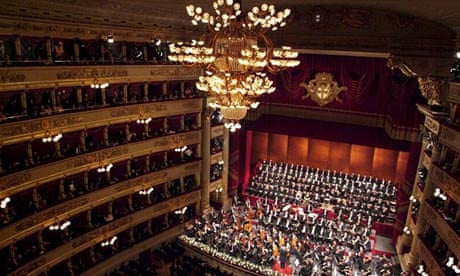One of Italy's veteran music critics has been blacklisted by La Scala after a series of reviews which the Milanese opera house has said "overstepped the limits" of journalistic propriety.
In a high-profile spat carried out on the pages of Corriere della Sera, the country's best-selling daily newspaper, the acidic and occasionally offensive reviews of Paolo Isotta have led the paper's editor-in-chief, Ferruccio de Bortoli, to accuse the opera house of "wanting the head" of his top critic.
Responding in a letter to the newspaper, Stéphane Lissner, La Scala's director, said the opera house had decided to "distance itself" from Isotta after a series of pieces "overstepped the boundaries" expected of a respected critic. The journalist will no longer be entitled to take up his customary free press tickets at future performances, he said. "Isotta has decided to lead personal campaigns at odds with the nature of a music critic and to use his articles not as moments of reflection but as weapons 'against' someone or another – institutions and artists," Lissner wrote in a letter to de Bortoli. "And La Scala has absolutely no intention of indulging this, even if the doors of the opera house remain open to the Corriere della Sera."
Over a number of years, Isotta's reviews have been peppered with the kind of unfavourable descriptions unlikely to endear him to musicians, conductors or singers. He branded Luciano Pavarotti a "musical illiterate" and once began a review of the opera Prometheus with the ominous words: "Ladies and gentlemen, the music is over."
But it appears to have been an offensive review of a recent concert at La Scala by the British conductor Daniel Harding that sealed the critic's fate. Isotta wrote that Harding had made Wagner sound "homosexual" and also attacked his Falstaff, a co-production with the Royal Opera House.
Isotta has refused to respond to Lissner's assessment of his work, apart from saying it contained "innumerable defamatory remarks".

Comments (…)
Sign in or create your Guardian account to join the discussion